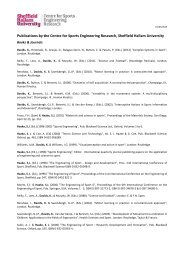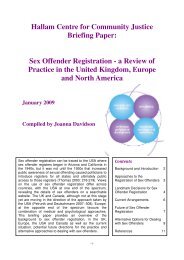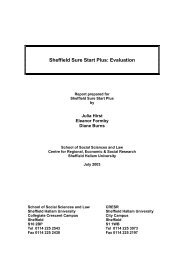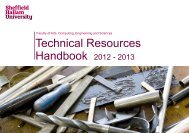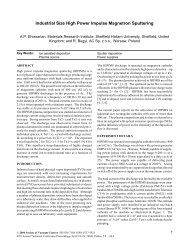The exercise of judicial discretion in rent arrears cases - Sheffield ...
The exercise of judicial discretion in rent arrears cases - Sheffield ...
The exercise of judicial discretion in rent arrears cases - Sheffield ...
Create successful ePaper yourself
Turn your PDF publications into a flip-book with our unique Google optimized e-Paper software.
ebated. <strong>The</strong> options <strong>in</strong> terms <strong>of</strong> possession orders are restricted to 28 days, or suspended<br />
on payment <strong>of</strong> <strong>arrears</strong>; no <strong>in</strong>formation is elicited on whether the order was made on<br />
mandatory or <strong>discretion</strong>ary grounds. Further, the alternatives <strong>of</strong> “claim dismissed” or “claim<br />
struck out” do not appear; the only possibility noted on the form is “claim withdrawn.” <strong>The</strong><br />
form used <strong>in</strong> Northern 2 court clearly reflects local practice, but it may also have an effect <strong>in</strong><br />
consolidat<strong>in</strong>g that practice. This court had the best ‘match’ between request and outcome,<br />
the highest number <strong>of</strong> outright possession orders, and the lowest number <strong>of</strong> adjournments<br />
recorded <strong>in</strong> all <strong>of</strong> the four courts.<br />
Individual judges, consistency and difference<br />
Hav<strong>in</strong>g explored the differences between courts, we now turn to the differences between<br />
<strong>in</strong>dividual judges. This was a matter <strong>of</strong> concern for the focus group participants, with both<br />
claimant and defendant representatives assert<strong>in</strong>g that there was a lack <strong>of</strong> consistency<br />
between the outcomes <strong>of</strong> similar <strong>cases</strong> <strong>in</strong> the same court. Inconsistency was said to arise<br />
especially regard<strong>in</strong>g the threshold <strong>of</strong> <strong>arrears</strong> over which diffe<strong>rent</strong> judges would make an<br />
order. Consistency was considered to be a desirable characteristic by all focus group<br />
participants, provided the judge took <strong>in</strong>to account the facts <strong>of</strong> each case.<br />
In each <strong>of</strong> the six focus groups held, there was a remarkable degree <strong>of</strong> agreement between<br />
participants about the characteristics which, from their perspective, made for an ‘ideal’ and<br />
consistent judge. Defendant representatives considered that fairness, understand<strong>in</strong>g, and<br />
accuracy were important. ‘Accuracy’ required judges to be well-<strong>in</strong>formed about the law as<br />
well as about local issues (particularly as regards hous<strong>in</strong>g benefit adm<strong>in</strong>istration). ‘Fairness’<br />
was generally regarded as:<br />
lack<strong>in</strong>g bias or prejudices;<br />
listen<strong>in</strong>g to arguments;<br />
read<strong>in</strong>g the papers thoroughly;<br />
question<strong>in</strong>g the claimant critically;<br />
hav<strong>in</strong>g no preconceptions.<br />
<strong>The</strong>se characteristics were l<strong>in</strong>ked to ‘understand<strong>in</strong>g’ that:<br />
the tenant might lose their home as a result <strong>of</strong> proceed<strong>in</strong>gs;<br />
tenants might have multiple problems, for example with debt or vulnerabilities;<br />
and<br />
judges therefore should try to put tenants at ease and expla<strong>in</strong> what is go<strong>in</strong>g on <strong>in</strong> the<br />
proceed<strong>in</strong>gs.<br />
31



